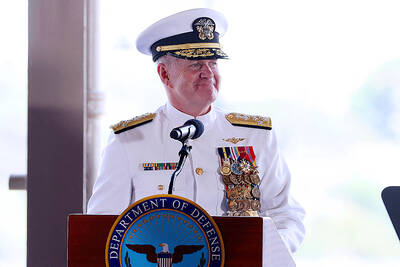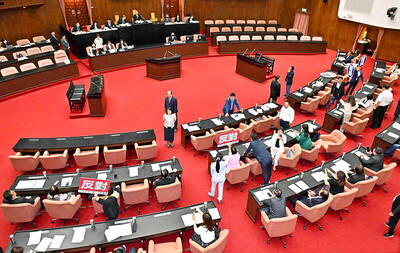What do AT&T, Boeing, Com-verse Technology, Prudential Financial, Medtronic, Schering-Plough and Tenet Healthcare have in common?
In recent months, they have all been charged with fraudulent conduct by the US Justice Department's Corporate Fraud Task Force, or with serious misconduct by government prosecutors.
Among other charges, the companies were accused of deceptive stock trading, improper billing, falsification of drug prices, kickbacks to doctors and the creation of a "secret stock options slush fund."
The total cost of their misconduct in fines and effective penalties to shareholders? A cool US$2.6 billion.
Enron aftermath
Almost five years after the Enron scandal first came to light, corporate crime involving major US companies appears to show no sign of abating, despite a government crackdown on corporate malfeasance.
Set up after Enron's collapse, the Corporate Fraud Task Force has taken the lead in prosecuting bad executive behavior.
Critics concede it has notched up major victories, notably the convictions of Enron's two former top executives, but some securities lawyers and investor advocates say corporate fraud has become so endemic that harsher penalties are needed to defeat it.
Jacob Zamansky, a New York lawyer whose firm, Zamansky and Associates, has filed securities lawsuits against big Wall Street brokerages, says more top executives need to be held accountable to deter corporate fraud.
"If the Justice Department is serious about showing enforcement, go after some top guys on Wall Street, in Corporate America," he said.
Slack prosecution
Zamansky believes the government did an "excellent job" in prosecuting the Enron case and other cases until last year but says that prosecutions have slackened overall this year.
A senior Justice Department official, who requested anonymity, argued, however, that the task force has been clamping down aggressively and that the flurry of recent cases was somewhat of an aberration.
"From July 2002 to March 2006, we've had more than 1,000 guilty pleas; more than 160 of those have been chief executive officers and [company] presidents," the official said.
Key members of the task force, which also groups Securities and Exchange Commission and FBI officials, met just last month to swap notes and plot strategy.
"We certainly seek to recover [money] vigorously and to the maximum extent we can consistent with the facts," the official said, adding that there are no plans to disband the task force.

NO-LIMITS PARTNERSHIP: ‘The bottom line’ is that if the US were to have a conflict with China or Russia it would likely open up a second front with the other, a US senator said Beijing and Moscow could cooperate in a conflict over Taiwan, the top US intelligence chief told the US Senate this week. “We see China and Russia, for the first time, exercising together in relation to Taiwan and recognizing that this is a place where China definitely wants Russia to be working with them, and we see no reason why they wouldn’t,” US Director of National Intelligence Avril Haines told a US Senate Committee on Armed Services hearing on Thursday. US Senator Mike Rounds asked Haines about such a potential scenario. He also asked US Defense Intelligence Agency Director Lieutenant General Jeffrey Kruse

INSPIRING: Taiwan has been a model in the Asia-Pacific region with its democratic transition, free and fair elections and open society, the vice president-elect said Taiwan can play a leadership role in the Asia-Pacific region, vice president-elect Hsiao Bi-khim (蕭美琴) told a forum in Taipei yesterday, highlighting the nation’s resilience in the face of geopolitical challenges. “Not only can Taiwan help, but Taiwan can lead ... not only can Taiwan play a leadership role, but Taiwan’s leadership is important to the world,” Hsiao told the annual forum hosted by the Center for Asia-Pacific Resilience and Innovation think tank. Hsiao thanked Taiwan’s international friends for their long-term support, citing the example of US President Joe Biden last month signing into law a bill to provide aid to Taiwan,

China’s intrusive and territorial claims in the Indo-Pacific region are “illegal, coercive, aggressive and deceptive,” new US Indo-Pacific Commander Admiral Samuel Paparo said on Friday, adding that he would continue working with allies and partners to keep the area free and open. Paparo made the remarks at a change-of-command ceremony at Joint Base Pearl Harbor-Hickam in Hawaii, where he took over the command from Admiral John Aquilino. “Our world faces a complex problem set in the troubling actions of the People’s Republic of China [PRC] and its rapid buildup of forces. We must be ready to answer the PRC’s increasingly intrusive and

STATE OF THE NATION: The legislature should invite the president to deliver an address every year, the TPP said, adding that Lai should also have to answer legislators’ questions The Chinese Nationalist Party (KMT) yesterday proposed inviting president-elect William Lai (賴清德) to make a historic first state of the nation address at the legislature following his inauguration on May 20. Lai is expected to face many domestic and international challenges, and should clarify his intended policies with the public’s representatives, KMT caucus secretary-general Hung Meng-kai (洪孟楷) said when making the proposal at a meeting of the legislature’s Procedure Committee. The committee voted to add the item to the agenda for Friday, along with another similar proposal put forward by the Taiwan People’s Party (TPP). The invitation is in line with Article 15-2